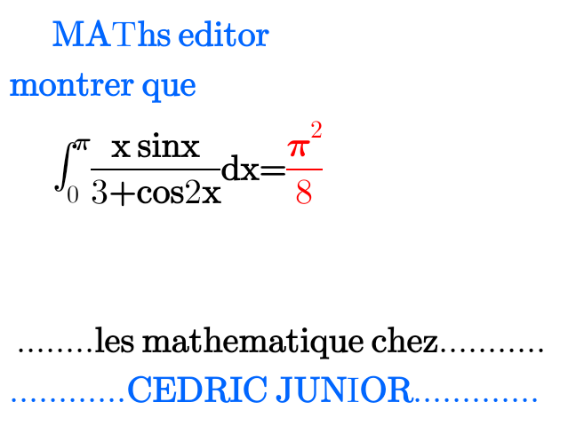
Question and Answers Forum
Question Number 174430 by CElcedricjunior last updated on 31/Jul/22

Answered by som(math1967) last updated on 01/Aug/22
![I=∫_0 ^π ((xsinx)/(2(1+cos^2 x)))dx =∫_0 ^π (((π−x)sin(π−x))/(2{1+cos^2 (π−x)}))dx =(π/2)∫_0 ^π ((sinxdx)/(1+cos^2 x)) −∫_0 ^π ((xsinx)/(1+cos^2 x))dx ∴I=(π/2)∫_0 ^π ((sinxdx)/(1+cos^2 x)) −I 2I=(π/2)∫_0 ^π ((−d(cosx))/(1+cos^2 x)) 2I=(π/2)[−tan^(−1) cosx]^π _0 2I=(π/2)[−(−(π/4))+((π/4))] I=(π^2 /8)](Q174432.png)
| ||
Question and Answers Forum | ||
Question Number 174430 by CElcedricjunior last updated on 31/Jul/22 | ||
 | ||
Answered by som(math1967) last updated on 01/Aug/22 | ||
![I=∫_0 ^π ((xsinx)/(2(1+cos^2 x)))dx =∫_0 ^π (((π−x)sin(π−x))/(2{1+cos^2 (π−x)}))dx =(π/2)∫_0 ^π ((sinxdx)/(1+cos^2 x)) −∫_0 ^π ((xsinx)/(1+cos^2 x))dx ∴I=(π/2)∫_0 ^π ((sinxdx)/(1+cos^2 x)) −I 2I=(π/2)∫_0 ^π ((−d(cosx))/(1+cos^2 x)) 2I=(π/2)[−tan^(−1) cosx]^π _0 2I=(π/2)[−(−(π/4))+((π/4))] I=(π^2 /8)](Q174432.png) | ||
| ||